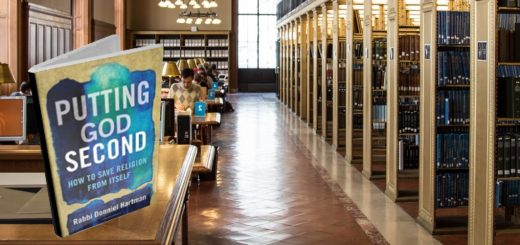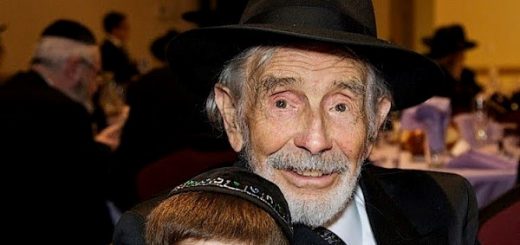Someone Else Who Gets It — Almost

While I don’t read the Baltimore Jewish Times often anymore, someone showed me this week’s issue and I came across an op-ed that I enjoyed reading. Given that the first half is filled with dismissive stereotypes regarding most any level of Jewish observance (though the author, of course, claims to “respect the choice” of “those who like to behave as robots”), the reader might wonder how I could possibly have “enjoyed” it. But if we ever so slightly rephrase the second half of the article, we come upon a stinging but largely accurate description of modern Jewish history:
The committee that revised the principles of Judaism transformed a faithfully maintained horse into a three-humped, spitting camel. A group of rabbis, the Reform Society of Frankfurt, rewrote the Torah that defined Judaism.
At that time, those Reformers should have chosen a new name for their new form of religion, that clearly was closer in philosophy to liberal Protestantism than Judaism. Instead, like the people who, without conscience, moved into the homes of deported Jews during The Holocaust, those who totally redefined Judaism settled into the pulpits of longstanding synagogues, built and nurtured by generations of dedicated Jews.
The good manners and tolerance of traditional Jews allowed this coup to occur. We thought the intruders were well-meaning, and we honored their dedication to their ideals.
Now we have little left of our principles, and academics who call themselves “Rabbi” insult our earnest dedication to the same Judaism that made sense in the 21st century (by our calendar). To those who misappropriated the cherished doctrine handed down to me by generations of my family and who now choose to be verbally abusive, I politely request that you try to be respectful of everyone’s attempt to live a life that merits a final amen.
I wouldn’t actually write something like that, especially because not every line really fits, and it’s unnecessarily nasty as well. But there is certainly a feeling of deja vu, of seeing what goes around come around, in the writer’s description of the usurpation of “classical” Reform Judaism by the “modern” Reform movement, with its untraditional focus on Jewish ritual.
The rest of her piece is informative only as a reflection of the tribulations of the Reform movement. Some of what she says in defense of “classical” Reform defies logic. For example:
Only after understanding the history and meaning of Jewish observance can one make educated, informed decisions about complying with assorted ancient practices. As a result, at Baltimore’s The Reform Temple, including our High Holiday services, our services are conducted in English to allow congregants to comprehend the meaning of our worship.
We want people to make educated, informed decisions — so we make sure our services are entirely in English, so that someone with no Jewish education whatsoever can make an educated decision. Am I reading this correctly? It’s certainly a fascinating redefinition of what it means to be “informed.”
It is the op-ed to which she is responding that so aptly describes the problem with the core philosophy of Reform, that of “personal choice:” “it undermines the notion of standards of any sort, making anything defensible and everything an equally valid choice.” But I don’t believe that particular barn door can be closed. We are observing a movement in collapse, that threatens to take millions of Jews with it on the way out.
Perhaps this insight, showing that the problems within Reform Judaism are a simply a reflection of Reform’s impact on Judaism itself, might influence even one of those millions.




For the second time in the past five years I have shockingly read public admissions by recognized Jewish leaders that the Reform and Conservative movements in America are destined for failure. Those who practice and follow the Orthodox tradition might not be surprised at the near bankruptcy of either of the above. It’s been more than two centuries since the giant sages such as the Chasam Sofer, Rav Yaakov Etlinger, and the legendary Rav Shamshon Refoel Hirsch of blessed memories understood the damaging ways of the Reformers and forewarned Torah observing Jews to stand firm and strong in battling any and all twisted interpretations of Judaism. They accurately foresaw the lurking dangers and where the reformists were headed.
We need to learn the lesson of Pirkei Avos: Ayzeh chochom horoyeh es hanoilad! No, the Orthodox leaders of yesteryear would not be so shocked at the public admissions today that the ways of life of both the Reform and Conservative movements are nothing more than a hollow and shallow spiritual facade of what otherwise should be a rich Torah observing life for Judaism to survive.
Arthur Hertzberg (a Conservative rabbi and self-confessed kofer and apikores) once asked Reform Rabbi Alexander Schindler what someone would have to do to be considered a mechalel shabbos by Reform Jewish standards. Rabbi Schindler could not give him an answer.
I think that the letter you refer to was by a woman with an axe to grind. Her Reform “temple” is actually non existant. She yearns for Classical Reform of the Pitsburg Platform and considers all of the established Reform Congregations to have abandoned “orthodox Reform”. I think they have services on the High Holidays but have no permanent location or rabbi.
There is an element of old timers who want Reform Judaism to be just like it was when they were young. Rabbi Wein tells of the Reform rabbi who introduced Lulav and Esrog into his services and was criticized for going against Reform tradition. Nowadays,Reform has a lot more Hebrew but is still a very far cry from anything found in an orthodox synagogue.
The battle is long over. In rabbiner Hirsch’s day, Reform was a danger, today it is no threat and our struggle is with apathy . Arthur Herzberg was a complex individual who loved his father and his father’s chassidism but went to the Seminary and became a scholar. Like everyone else, it is hard to put anyone into a catagory.